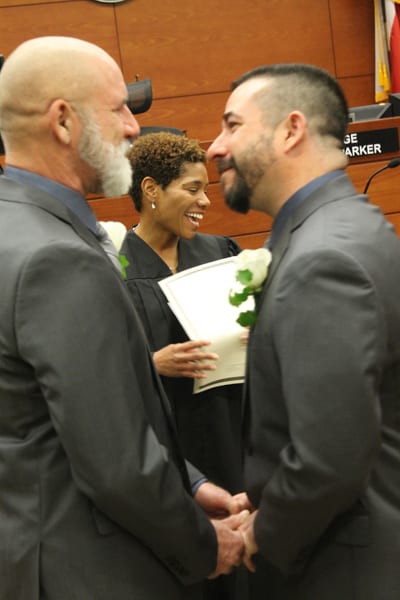 Mark Jiminez, better known as Major, and Beau Chandler were married by Judge Tonya Parker in her courtroom at noon today (Thursday, Jan. 5) exactly four-and-a-half years after they were first arrested for trying to get married in Texas.
Mark Jiminez, better known as Major, and Beau Chandler were married by Judge Tonya Parker in her courtroom at noon today (Thursday, Jan. 5) exactly four-and-a-half years after they were first arrested for trying to get married in Texas.
On July 5, 2012, Jimenez and Chandler got in line at the Dallas County Clerk’s on the second floor of the Dallas County Records Building to request a marriage license. The clerk brought them into an adjoining room and, through tears, explained she was unable to issue that license under Texas law.
Chandler and Jiminez handcuffed themselves to the stanchion at the front of the line and sat in protest for the rest of the day.
Dallas LGBT police liaison Laura Martin, who had no jurisdiction because it was a county office building, and Shelley Knight, LGBT sheriff’s liaison, sat with the couple along with TV and Dallas Voice reporters.
When the building closed at 4:30 p.m., sheriff’s deputies told the couple to leave or face arrest for criminal trespass. Jiminez unlocked the handcuffs, but the couple refused to leave. Deputies escorted them downstairs and privately offered to let the couple go, if they would leave. They refused and were escorted to jail.
“They’re the nicest couple,” Martin said of Chandler and Jiminez at the time. “They’re the first guys after any protest to come up and thank the officers.”
Overnight they made bail, and during their time in Lew Sterrett, Jiminez said Sheriff Lupe Valdez looked in on them.
The couple made several court appearances. Each time, a group of supporters protested outside the Crowley Courts building.
In a plea deal, they agreed to serve 40 hours of community service, Chandler raised money for Youth First and Jiminez for the North Texas Food Bank.
Jiminez was arrested a second time on Aug. 2, 2012 when he and Chandler again tried to get a marriage license. They repeated their protest throughout the day and at 4:30 p.m., they uncuffed themselves. Jiminez was arrested. Chandler agreed to leave the building and he left to get bail money. A group of protesters stood vigil outside Lew Sterrett until Jiminez was released.
After the marriage equality ruling on June 26, 2015, Jiminez and Chandler planned to get married and even got a marriage license, but illness intervened.
On Marriage Equality Day, they drove to Arkansas to share the news with Chandler’s mother, who was in the hospital. She asked them to wait until she could be there with them for their big day. Their attention shifted focus to caring for her. His mom passed away in October. Then Jiminez’s mother became ill and passed away in May 2016.
As they worked their way through the grieving process, they decided to set a new date and picked April 20, 2017, their five-year anniversary. Then the November election happened and they decided to push the date up. They said they fear court appointments and legislation that could reverse much of the progress the LGBT community has made over the last few years.
“We hope to see gay and lesbian couples resisting the backlash we feel we are about to see and one of the ways we can do this is by continuing to get married,” Jiminez said.
Before the marriage equality ruling, Parker was not performing weddings, something a judge in Texas may do but is not required to do. Parker said she would marry couples when all couples could get married.
On Marriage Equality Day, other judges allowed Parker to symbolically perform the “first” same-sex wedding in Dallas County. (Judge Dennise Garcia performed the actual first same-sex marriage in Dallas County, between George Harris and Jack Evans). Today, Parker happily married the couple that went to jail fighting for their right to marry.
Major and Beau finally get married

